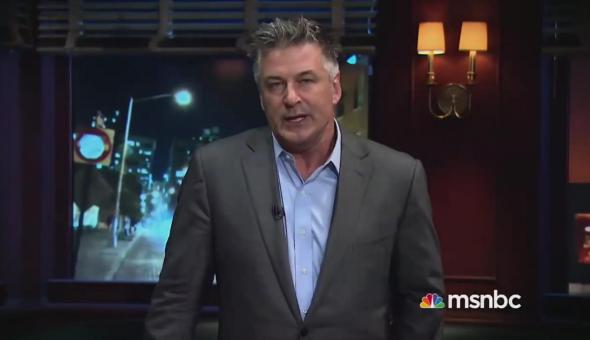Alec Baldwin’s new talk show on MSNBC, Up Late with Alec Baldwin, distinguishes itself from other extended one-on-one interview programs like Charlie Rose and Inside the Actors Studio first and foremost with its set décor. There are no desks or couches or hard-backed chairs. Instead, Baldwin, his thick thatch of grey hair spiking like a porcupine, his collar open, natters with his guests on a set that resembles a diner with pretensions or a supper club on the skids.
In Friday night’s premiere episode, Baldwin and New York mayoral candidate Bill de Blasio sat at a green leather booth in front of Venetian blinds covering fake windows, papers and ceramic mugs scattered out over the Formica table top, as if the men had just fled crowded midtown streets to seek refuge in a rare Manhattan joint with bottomless cups of coffee, cloth napkins, free coleslaw on the side, and a persistent soundtrack of NPR-approved jazz. So ensconced, Baldwin on Up Late fostered the impression of ceaseless, civilized, My Dinner with Alec-style conversation. The show does not hard-cut to commercial, it just fades out while Baldwin’s mellifluous voice asks another question, as if while you’re watching ads, Baldwin is continuing his erudite conversation—unwilling to acknowledge, let alone pause for, anything so crass and banal as a 30-second spot.
I fixated on the furniture because the proceedings were so willfully wonky. The exact shade of green of the leather banquettes (maybe, I think, a true Hunter green) was more absorbing than the very dull, informed conversation Baldwin and de Blasio were having about New York City tax policy. The first episode of Up Late was an overt statement of seriousness from Baldwin that his is a show for liberal grown-ups. (Most of Baldwin’s wisecracks involved mocking the former MSNBC show Alan Keyes Is Making Sense.) It was exactly the sort of in-depth conversational television that civic-minded people, cable-news detesters, and Aaron Sorkin are always lamenting the absence of. It was also no fun to watch.
Baldwin questioned de Blasio from the left about marijuana and the police and asked skeptically about his ability to raise taxes. He occasionally evinced a slightly mischievous bent—he asked if de Blasio’s policies could only exist in New York, “where there are a lot of wealthy liberals willing to subsidize the things you want to do”—and intimated that he gets into a lot more conversations about early education than you might think: “Everywhere” Baldwin goes, apparently, “people are praising universal Pre-K.” Baldwin’s particular strain of macho-liberalism, his set of echt-Blue Collar-meets-wealthy-celebrity-privilege values, got their quintessential showcase when he asked de Blasio whether he believes in subsidizing “people’s right to live in Manhattan.” Do you say, Baldwin wondered, to your “economic fathers, and—I don’t want to be sexist here—mothers, Why don’t we just let Manhattan be Bel Air?”
This question, like most of what Baldwin has done post-30 Rock to re-position himself as a public liberal, is noticeably of a piece with Baldwin’s Jack Donaghy persona. Jack Donaghy is famously conservative, but that character’s innate authority, particularly about political and economic matters, is integral to Alec Baldwin’s blossoming career as a radio host, not-quite-political candidate, and now MSNBC personality. By being such a heavyweight, Donaghy encouraged people to take Baldwin more seriously: The character conferred power on the actor. Baldwin is not Jack—Jack would only have selected a long policy interview as a show’s premiere when he was trying to tank NBC—but unlike many celebrities saddled forever to a fictional being, the more you confuse the two, the better it is for Baldwin. And it can get confusing: Falling asleep to Up Late—and you’ll have to trust me on this—it’s hard to tell if it’s Alec Baldwin’s or Jack Donaghy’s resonant tenor lulling you into slumber. Up Late could improve immeasurably—this week, thankfully, Debra Winger will be on—but it’s already the best show on TV to fall asleep to.
